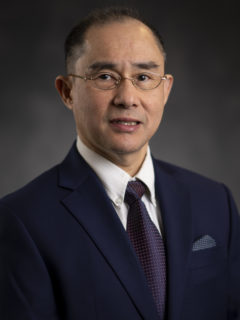President's Column
 January 2024
January 2024
The AAEA Board recently met with the leadership of the Association of Environmental and Resource Economists (AERE) (Karen Fisher-Vanden, AERE President, Valerie Mueller, AERE board member, and Tonya Wade, AERE Executive Director). The primary focus of our meeting revolved around revitalizing the relationship between AAEA and AERE. One tangible idea that emerged from the discussions was a joint venture for a fall 2024 virtual workshop. This collaboration would involve selecting a mutual topic of interest and allowing members from both associations to participate as presenters and attendees. We are currently setting up a small working group to move this idea forward.
AAEA is continuing its efforts in Washington, DC to support federal funding for economic research and has been working with Congress and coalition partners to promote investments in key agencies and programs including the Economic Research Service, National Agricultural Statistics Service and the National Institute of Food and Agriculture. AAEA is also engaging with policy makers on the pending reauthorization of the Farm Bill and has advanced a petition to the Department of Homeland Security (DHS) requesting the addition of agricultural economics as a STEM designated degree program. The petition is currently under consideration by DHS. The next update to the STEM degree list is expected later this year. View all of the past Government Relations & Washington Updates here.
As I mentioned a few months ago, AAEA has a cooperative agreement with ERS to set forth a comprehensive strategy to enhance diversity and inclusion within the field of agricultural and applied economics. A goal is to expand the number of students from underrepresented groups pursuing advanced degrees and careers in agricultural and applied economics. We will further work to ensure students have the support, resources, and skills to complete degrees and successfully pursue research careers in agriculture and applied economics. The first year of the project is focused on the development of a formal plan generally described as follows:
- Short run: Develop a plan for identifying mentors and programs to support underrepresented minorities in the profession.
- Medium run: Increase the share of underrepresented groups in graduate programs and among early career professionals.
- Long run: Ensure long-term retention and success for underrepresented minorities through all stages of developing agricultural and applied economics professionals.
The working committee, chaired by Andrew Muhammad, has identified key focus areas for 2024, including strengthening partnerships with MANRRS and FFA, conducting a thorough census of initiatives across universities, and developing strategies to engage regional agricultural economic associations. Subcommittees will be led by committee members: Andrew Muhammad, Norbert Wilson, Cesar L. Escalante, Mohammed Ibrahim, Kenrett Y. Jefferson-Moore, Kristin Kiesel, Joey E. Mehlhorn, and Marco A. Palma. The committee will also be recruiting undergraduate and graduate students this year and hire a consultant to assist with project goals.
The AAEA Access Taskforce, established in August 2023, aims to identify concerns that limit all members of the AAEA from fully participating in the professional association, including the summer meetings. Members of this taskforce were recruited to represent several sections in the organization, including COSBAE, CWAE, Department Chairs Section (CHAIRS), Graduate Students (GSS), and Seniors in the Profession. The taskforce members are Sathya Gopalakrishnan (chair), April Athnos, Vincenzina Caputo, Gail Cramer, Elizabeth Fraysse, Chrystol Thomas, and Sarah Low. In the first three months, they have focused on (i) identifying key groups to connect with to understand challenges, needs, and potential opportunities; (ii) developing a process to seek input from AAEA members; and (iii) organizing focus group discussions to gather information from members to inform a member survey (Spring 2024). They have identified the following groups of AAEA members (and non-members) to connect with for input:
- Members in non-R1 universities (i.e., HBCU/1890/1994)
- Industry professionals
- Government professionals
- Graduate Students
- Caregivers and people facing career interruptions
- International members/scholars
They have also developed a short questionnaire and a series of open-ended questions for discussion to seek input from members. They plan to conduct more focus group discussions in Spring 2024, which will be followed by a member survey, with the focus group results informing survey content.
The AAEA Health and Wellbeing Task Force (Carola Grebitus and Alicia Rosburg (co-chairs), Kelly Davidson, Elena Krasovskaia, Bailey Samper, Anne Byrne, Jane Kolodinsky, John Lai, Nilufer Cetik, and Helen Jensen) is actively curating events for the 2024 AAEA Annual Meeting. They are in the process of developing a symposium focused on promoting health and wellbeing of AAEA members. Additionally, the task force is investigating various interactive conference activities designed to equip members with practical strategies for stress reduction and relaxation techniques.
Thank you,









